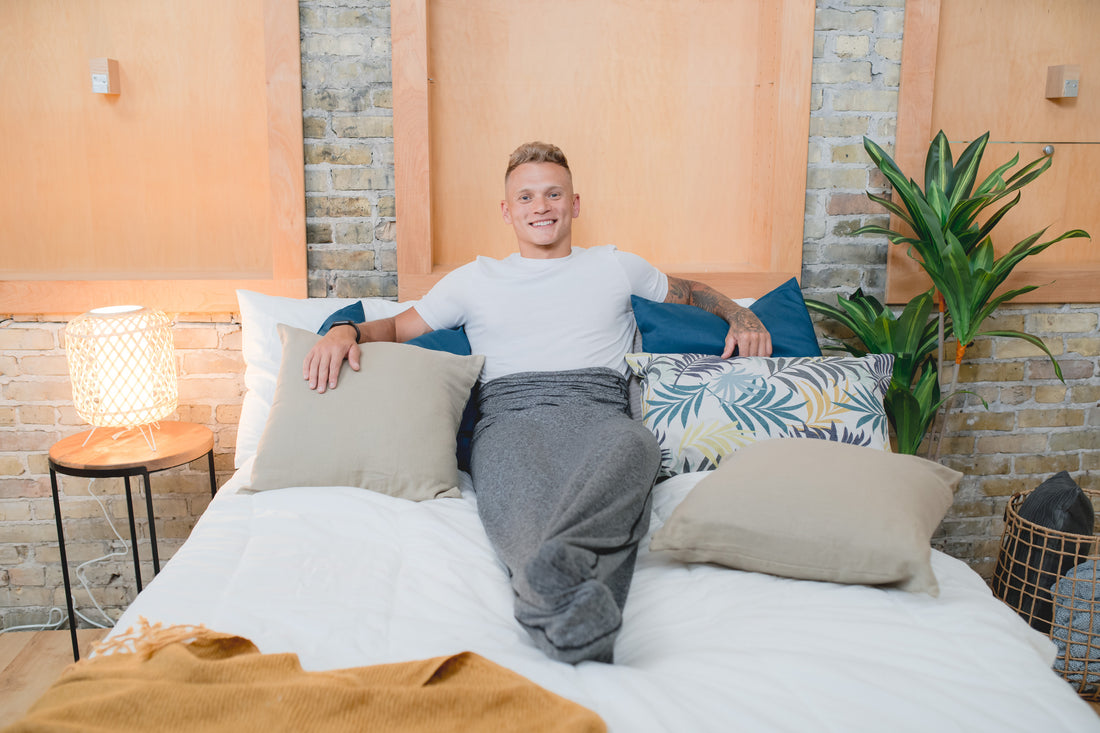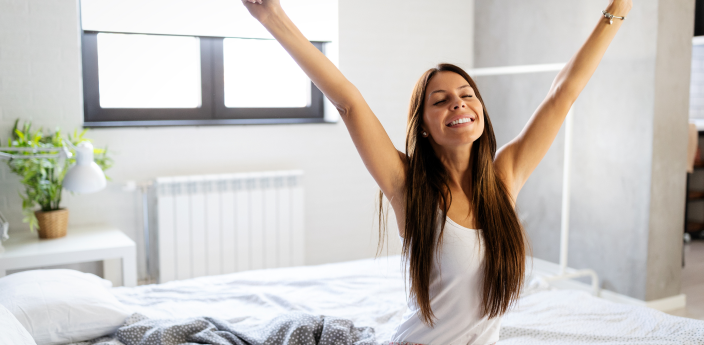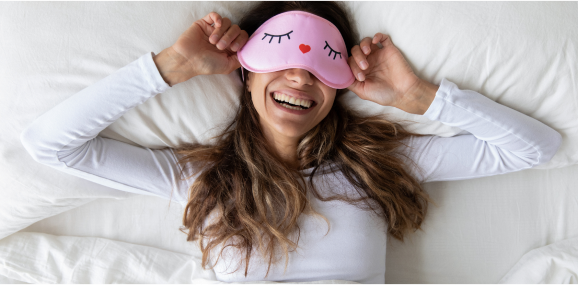Sleeping is one of the most important things we do. Sleep resets the body, promotes a healthy immune system, gives the body energy, and so much more. And although for many, sleep is a time to relax and rest their weary eyes, for others, it’s a time of high anxiety.
For many people, there exists a fear of sleeping alone. At night, many people feel unsafe, and that can cause feelings of anxiety, which can negatively impact both the length and quality of sleep.
Sleeping alone after always sleeping next to someone can be a hard transition. You’re used to the way the person, or even pet, slept next to you, how they stole all the covers, or took up most of the bed space. You probably got so used to them next to you, that now that they aren’t there, the bed feels empty.
This is a completely normal feeling and a lot of people go through this. Whatever the reason for an emptier bed may be, the fear of sleeping alone and the feelings of anxiousness or discomfort associated with it can all be a real struggle.
You’ve come here to see how you can get more rest while you’re sleeping alone, and we’ve got some answers and options that may be able to help.
Reasons Why You May Be Having Trouble Sleeping Alone
If you’re finding yourself unable to sleep at night if you’re alone, you’re not alone in this struggle. Many people struggle with this and have their sleep negatively impacted because of it.
Somniphobia
One common reason people find themselves unable to sleep alone is the fear of actually going to sleep, also known as somniphobia. This centers around restless or uncontrollable thoughts, and prevents people from falling asleep even if they are tired.
A few examples of these kinds of thoughts include:
- Restless thinking about the health problems that they, or someone close to them, might have
- Dying in sleep and not waking up
- Worrying about nightmares
- Worrying about how they will act in their sleep (sleepwalking, talking in their sleep, etc)
- Worrying about intrusion in their home while they sleep
A large portion of somniphobia is related to worrying, which is why it’s seen as a type of anxiety. Most of the origins of somniphobia cases can be traced back to a traumatic event that involved sleeping or falling asleep. These traumas include but are not limited to sleeping through the death of a loved one or sleeping through a natural disaster. And these traumas don’t have to happen specifically just to you -- you can see them being played out in someone else’s life like a close friend or even in a movie. This can onset fear and cause fear of sleeping alone to arise.
A few symptoms of somniphobia include:
- Sweating
- Irregular or rapid heartbeat
- Nausea
- Feelings of dread
- Rapid breathing/shortness of breath
- Panic attacks before or even during sleep
Somniphobia can be serious if left untreated, and can cause a significant negative impact on your overall health and wellbeing, both in body and mind. A major result of somniphobia is fatigue due to lack of sleep. If you think you may have somniphobia, seek advice from your doctor to get next steps on how to best treat it.
Grief
Grief is a large reason why so many people find it incredibly hard to sleep alone. Sleep disturbances are very common when you’re going through grief, particularly for those who are widowed as well as those suffering from “complicated grief,” which is also referred to as prolonged grief disorder or traumatic grief.
Grief does not have a scale or a time limit. It stretches with each person and stays with each person for an unspecified amount of time. And experiencing grief doesn’t just have to be caused by the death of a loved one. It can manifest for an abundance of reasons and can cause inability to fall asleep, alone or otherwise.
After experiencing loss of any kind -- a job, a relationship, financial stability -- grief is a natural response. When we experience grief, a flood of neurochemicals and hormones invades our brain. “There can be a disruption in hormones that results in specific symptoms, such as disturbed sleep, loss of appetite, fatigue, and anxiety,” says Dr. Phillips, a neuropsychologist at Henry Ford Health System.
Grief can actually cause rewiring in the way your brain operates. It can lock the brain in a permanent stress response. There is a way to promote healthy rewiring though, whether that be through therapy, medication, or lifestyle changes.
Over 800,000 American seniors lose their spouse or partner each year. If you have lost your partner, the one who always slept next to you, this can cause extreme bouts of grief that can make it feel impossible to sleep alone. It can cause difficulty in even going about your regular bedtime routine without your spouse by your side. This specific kind of loss of a partner can make you feel unsafe in bed, making it that much more difficult to fall asleep alone.
Decrease in Specific Hormones
When you sleep next to someone or cuddle up with your dog, you trigger specific physical and mental processes that can affect your quality of sleep at night. For example, a major process is the release of the hormone oxytocin, which helps to lower the stress hormone, cortisol, while also effectively strengthening the bond between you and whoever you’re cuddling with.
The fear of sleeping alone without these benefits is valid. But there are ways to combat this hormonal fluctuation that we’ll be discussing later on in this article.
How To Get More Sleep When Sleeping Alone
There are many more reasons for why you personally feel afraid to fall asleep while you’re alone. But whatever the reason, we promise there is hope to be had. Check out a few suggestions on how you can combat your fear of sleeping alone.
Find a Therapist
Therapy is a really great way to work through your fears. There are multiple types of therapies that you can try, such as psychotherapy, exposure therapy, and cognitive behavioral therapy.
Cognitive behavioral therapy, also referred to as the abbreviated CBT, can involve exposure or thought reframing combined with other techniques to learn ways to cope with the feared object or situation differently. Through CBT, you can learn alternative ways to approach and think about your fears, bodily sensations, and the specific impact they’ve had on your life.
Try Out a New Sleeping Arrangement
Breaking from routine when you are experiencing fear of a specific situation is an easy way to combat the negativity associated with sleeping alone.
Grant yourself the permission to break routine and sleep away from your bed. You can choose to sleep in another room of the house, on the couch, or even on an air mattress. Doing this for a long period of time is not suggested, mostly due to the back pain that a couch or air mattress could cause, but switching where you sleep for a little while is a way to separate yourself from the fear and get some relief for a little while.
Relaxation App
There are many apps on the market right now that can help with calming feelings of anxiety, especially when trying to fall asleep. There are tons of apps out there that offer sleep stories, guided meditations, or soothing sounds, such as ocean waves or fire prickling on wood. Try out an app before bed to help put your mind at ease.
White Noise Machine
Another option could be to try out a white noise machine. This will put a relaxing sound into the empty space and can help with relaxation. White noise actually contains all frequencies at equal intensity, which is why it’s able to mask both literally and figuratively loud sounds that might be stimulating your brain, such as outside traffic or anxious thinking.
Be Aware of What You Watch
Watching a scary television show or movie before you go to bed is probably not the best idea. This can cause your anxiety levels to heighten, raising your blood pressure and heart rate, making it even harder to fall asleep, and generally just making you more paranoid.
Avoid watching anything that you know will scare you before you go to sleep alone so you’re able to have a better night of rest.
Try Out the Sleep Pod
Hug Sleep has designed a blanket called the Sleep Pod that can offer feelings of comfort and security to those sleeping alone.
The Sleep Pod is a blanket that actually hugs you back. The patented design uses Deep Touch Pressure Therapy, or DTP, to provide a gentle and calming pressure to your entire body.
The blanket has a unique, cocoon-like shape that wraps you up, helping to prepare you for a great night of sleep. Even better, it’s made from a specialized four-way stretch material that is breathable, light-weight, and doesn’t trap heat.
If you’re experiencing a fear of sleeping alone, this blanket is perfect to curl up in as that gentle pressure can help relax you and provide a sense of security.
Sleep Soundly, Alone
It might not seem possible now, but it is possible to sleep soundly alone with the right strategy. The fear of sleeping alone is a real struggle that many people deal with on a regular basis. Thankfully, implementing any of the above can be the first step of working through that fear.
Whether it be through therapy, a new sleeping arrangement, or a blanket that hugs you back, we hope you find what works for you so you can go back to sleeping soundly!
Sources:
Sleep Anxiety: What is it, Causes, Symptoms & Treatment | Cleveland Clinic
A Fear of Sleep: Somniphobia | Psych2Go
Complicated grief - Symptoms and causes | Mayo Clinic
How Coping With Grief Can Affect Your Brain | Henry Ford
https://medicalxpress.com/news/2021-03-grief-rewires-brain-affect-healthand.html
How Grief and Complicated Grief Affect Sleep | Sleep Foundation
Can't Sleep Alone? Common Causes And Tips to Overcome Them | Sleep Advisor
Specific phobias, diagnosis and treatment | Mayo Clinic
Pink Noise Vs. Brown Noise, Black Noise, and White Noise for Sleep | Healthline

































500,000+ happy customers